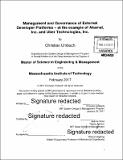| dc.contributor.advisor | Jeanne Ross. | en_US |
| dc.contributor.author | Umbach, Christian | en_US |
| dc.contributor.other | System Design and Management Program. | en_US |
| dc.date.accessioned | 2017-06-21T18:21:20Z | |
| dc.date.available | 2017-06-21T18:21:20Z | |
| dc.date.copyright | 2017 | en_US |
| dc.date.issued | 2017 | en_US |
| dc.identifier.uri | http://hdl.handle.net/1721.1/110142 | |
| dc.description | Thesis: S.M. in Engineering and Management, Massachusetts Institute of Technology, School of Engineering, System Design and Management Program, 2017. | en_US |
| dc.description | Cataloged from PDF version of thesis. Vita. | en_US |
| dc.description | Includes bibliographical references (pages 84-90). | en_US |
| dc.description.abstract | How do companies manage and govern external developer platforms? Drawing on platform ecosystem, product management, and IT governance theory a comparison of the developer platform approaches of two technology firms, Akamai, Inc. and Uber Technologies, Inc. is presented. Internal organizational structures and processes are evaluated in combination with external governance mechanism to develop and manage third party partner relations. The case studies test existing IT governance and app developer platform theory with regards to its applicability to platforms for developer products such as APIs. The two teams are analyzed along the dimensions of organizational structure, internal governance process and risk management, external governance and partner relations, as well as KPIs for team steering. A set of key governance mechanisms is identified as success factors for limiting risks around open developer platforms: Internally, API standards and working groups supported by a high degree of interconnectedness support governance and avoid de-acceleration around a company's product development process. Externally, legal agreements around terms of use shift control from the developer to the platform provider. Access limitations can serve as a supporting gatekeeper for access, or punitive penalty in case of violations of agreements. In support of contractual agreements, transparent developer communication around a firm's intended fields of innovation help avoid discords between developer platform providers and its users. Results are discussed. | en_US |
| dc.description.statementofresponsibility | by Christian Umbach. | en_US |
| dc.format.extent | 90 pages | en_US |
| dc.language.iso | eng | en_US |
| dc.publisher | Massachusetts Institute of Technology | en_US |
| dc.rights | MIT theses are protected by copyright. They may be viewed, downloaded, or printed from this source but further reproduction or distribution in any format is prohibited without written permission. | en_US |
| dc.rights.uri | http://dspace.mit.edu/handle/1721.1/7582 | en_US |
| dc.subject | Engineering and Management Program. | en_US |
| dc.subject | System Design and Management Program. | en_US |
| dc.title | Management and governance of external developer platforms - at the example of Akamai, Inc. and Uber Technologies, Inc. | en_US |
| dc.type | Thesis | en_US |
| dc.description.degree | S.M. in Engineering and Management | en_US |
| dc.contributor.department | Massachusetts Institute of Technology. Engineering and Management Program | en_US |
| dc.contributor.department | System Design and Management Program. | en_US |
| dc.identifier.oclc | 987235288 | en_US |
